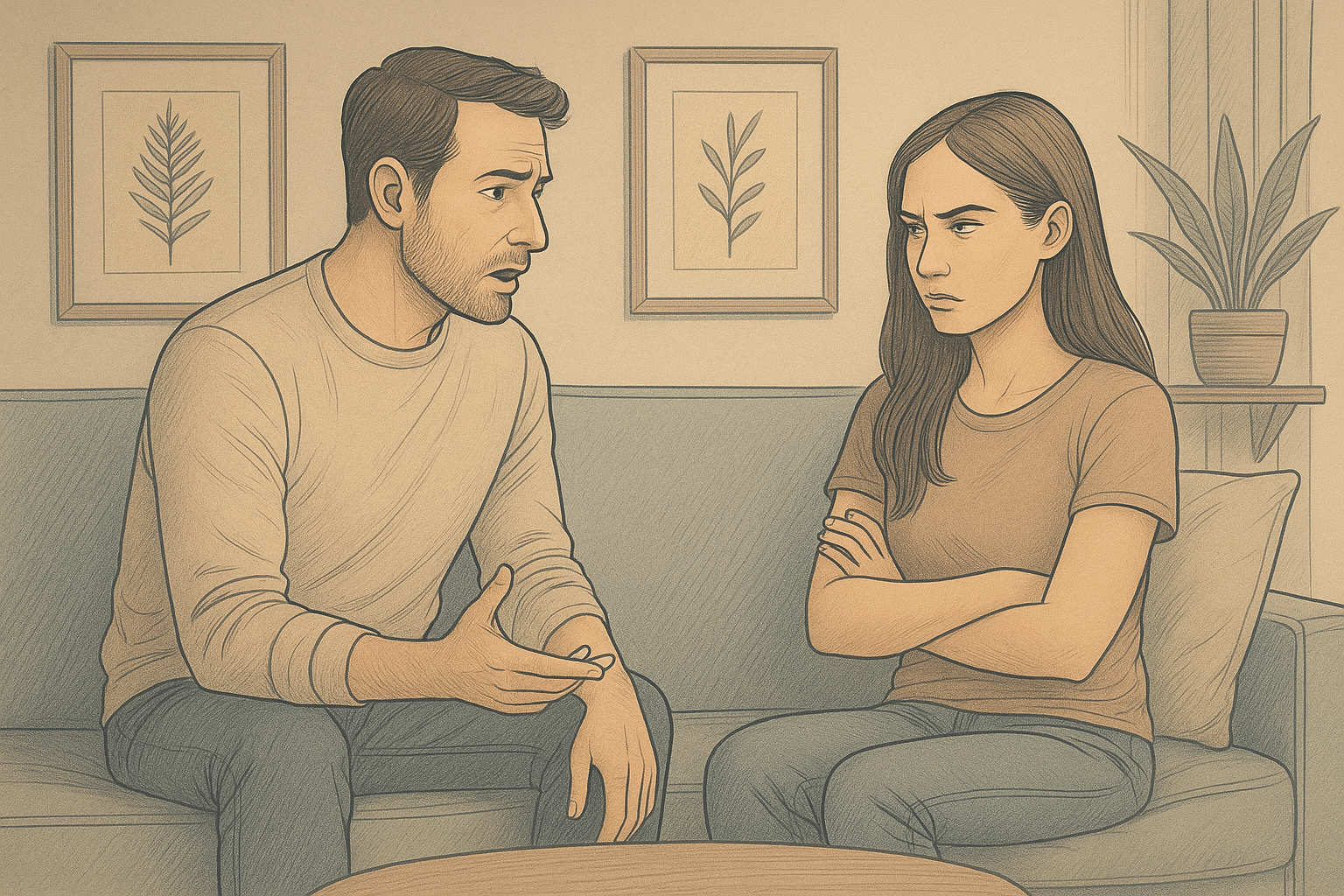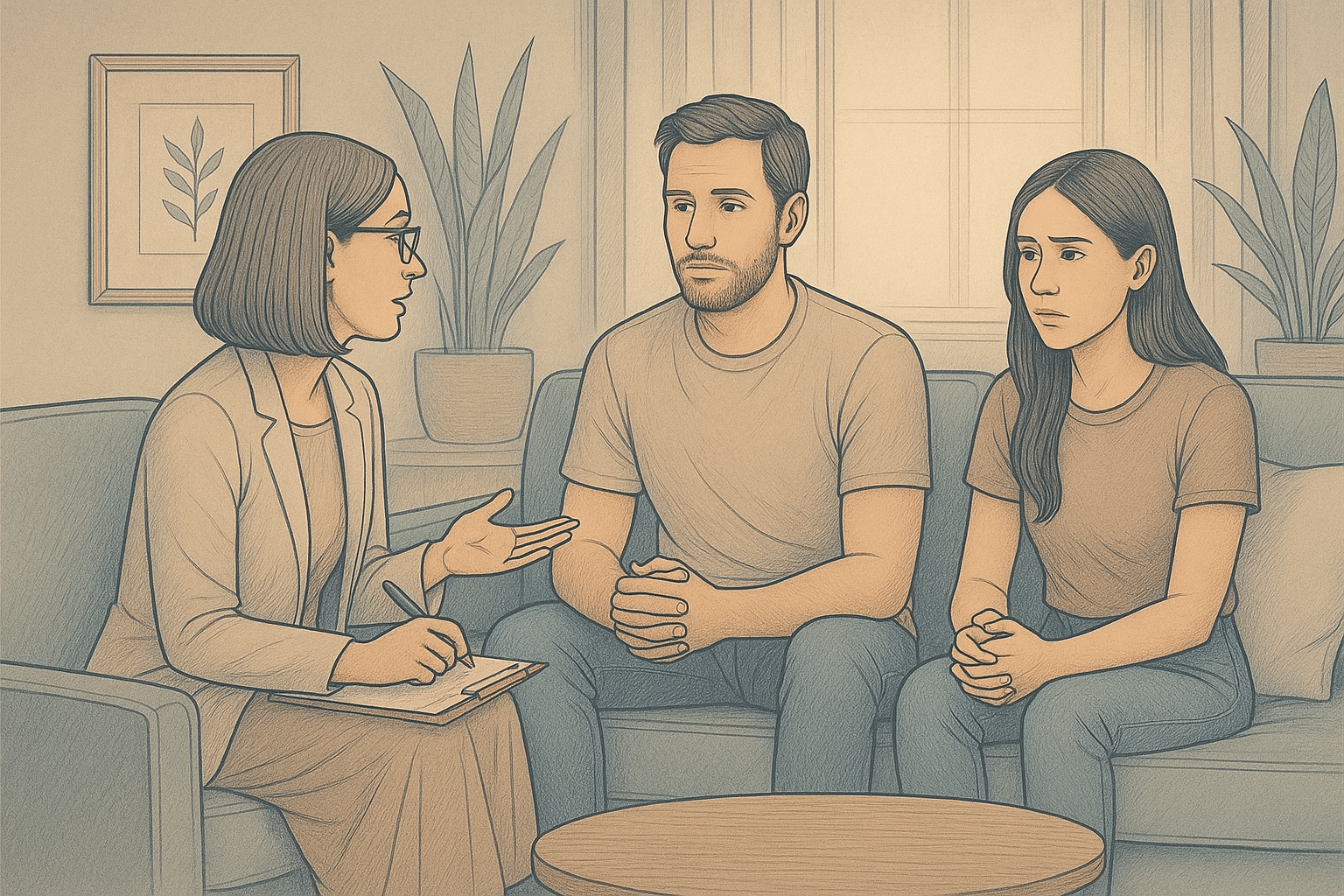Key Takeaways
- Trauma triggers in relationships are emotional reactions that occur when present experiences unconsciously remind us of past painful events.
- Common relationship triggers include criticism, feeling abandoned, conflict, physical touch issues, and controlling behaviors.
- Your body often recognizes triggers before your mind does. Physical symptoms like racing heart, muscle tension, and shallow breathing are warning signs.
- Effective management techniques include grounding exercises, time-out systems, and reality-testing your thoughts
- AMFM specializes in comprehensive trauma treatment with evidence-based therapies like EMDR and trauma-informed care, offering personalized treatment plans across residential, outpatient, and intensive care programs.
What Exactly Are Trauma Triggers in Relationships?
Trauma triggers are stimuli, words, actions, situations, even sensations, that unconsciously remind your brain and body of past painful experiences.
In relationships, these triggers can be particularly intense because intimate connections naturally increase our vulnerability.
What might look like an overreaction to others is actually your nervous system trying to protect you from what it perceives as a threat based on previous experiences.
The Brain’s Protective Response
When you experience a trigger, your brain isn’t malfunctioning, it’s actually doing exactly what it was designed to do: protect you.
The amygdala, your brain’s alarm system, recognizes patterns similar to past threats and activates your body’s stress response before your conscious mind has time to process what’s happening.
This explains why triggers feel so immediate and overwhelming. Your body floods with stress hormones like cortisol and adrenaline, preparing you to fight the threat, run from it, or freeze until it passes.
This biological response happens in milliseconds, often before you’ve had a chance to rationally evaluate the situation.
Why Relationships Often Activate Trauma
Relationships have a unique ability to trigger past trauma for several important reasons. First, they involve emotional intimacy that naturally lowers our defenses, making us more vulnerable to triggers.
Second, the dynamics in our current relationships often unconsciously mirror our earliest attachment experiences, for better or worse. Additionally, relationships involve dependency and trust, two elements that may have been violated during traumatic experiences.
Many people are surprised to discover that triggers can emerge even in healthy, loving relationships. This isn’t a reflection of your partner’s behavior or the quality of your relationship, it’s your nervous system trying to protect you based on its outdated threat assessment system.
Founded in 2010, A Mission For Michael (AMFM) offers specialized mental health care across California, Minnesota, and Virginia. Our accredited facilities provide residential and outpatient programs, utilizing evidence-based therapies such as CBT, DBT, and EMDR.
Our dedicated team of licensed professionals ensures every client receives the best care possible, supported by accreditation from The Joint Commission. We are committed to safety and personalized treatment plans.
5 Common Relationship Triggers and Their Origins
1. Criticism or Harsh Words
For someone who grew up with verbally abusive or highly critical caregivers, even mild criticism from a partner can trigger intense feelings of shame, worthlessness, or fear.
Your nervous system doesn’t distinguish between your partner’s frustrated comment about dirty dishes and the harsh criticism you may have endured as a child, it registers the similar emotional tone and activates protection mode.
2. Feeling Ignored or Abandoned
For those with abandonment wounds from childhood, perhaps from a parent who was absent, inconsistent, or emotionally unavailable, a partner working late, needing alone time, or even being on their phone can activate profound distress.
The adult mind might understand the situation logically, but the wounded part feels the same panic and desperation it did years ago.
3. Conflict or Raised Voices
If you grew up in a household where conflict escalated into violence or emotional abuse, even normal disagreements can trigger your survival responses.

You notice your body reacts before you do, as it tries to protect you.
This can manifest as an overwhelming need to either placate your partner (fawning), shut down completely (freezing), flee the situation (flight), or become defensively angry (fight).
4. Physical Touch or Intimacy Issues
Survivors of physical or sexual trauma may find that certain types of touch, specific physical positions, or even particular words can suddenly trigger flashbacks or emotional distress.
What makes this particularly challenging is that these triggers can emerge unexpectedly even in consensual, loving relationships where there is no actual threat. Your body is responding to sensory memories, not current reality.
5. Control or Dominating Behaviors
When a partner makes decisions without consulting you, tells you what to do, or exerts control in ways that feel restrictive, this can trigger intense reactions for those who previously experienced controlling or authoritarian treatment.
Even when a partner’s intentions are benign, perhaps they’re simply making a restaurant suggestion, the feeling of having choices taken away can activate deep-seated resistance or fear responses.
5 Effective Strategies to Manage Triggers in the Moment
1. Grounding Techniques to Stay Present
Grounding techniques help anchor you to the present moment when triggers threaten to pull you into past emotional states.
The 5-4-3-2-1 technique is particularly effective: identify 5 things you can see, 4 things you can touch, 3 things you can hear, 2 things you can smell, and 1 thing you can taste.
This methodical process engages multiple senses, redirecting your brain’s attention from threat response to current reality.
2. Creating a Time-Out System
Establishing a pre-planned time-out system with your partner can be invaluable when triggers arise.
Unlike storming out in the middle of a conflict, a thoughtful time-out involves communicating that you need space to regulate your emotions, setting a specific time to reconnect, and using that break constructively to self-soothe rather than ruminate.
This approach honors both your need for emotional regulation and your partner’s need for resolution.
3. Self-Soothing Methods That Work
Self-soothing techniques directly address the physiological activation of your nervous system.
Effective approaches include wrapping yourself in a weighted blanket, taking a warm shower, gentle stretching, listening to calming music, or holding something comforting.
These activities activate your parasympathetic nervous system, the “rest and digest” response that counteracts the stress reaction.
4. Breathing Exercises for Immediate Relief

Controlled breathing directly influences your nervous system, signaling to your brain that the danger has passed.
One effective breathing technique is box breathing: inhale for a count of four, hold for four, exhale for four, hold for four, and repeat.
This rhythmic pattern helps regulate your heartbeat and oxygen levels, counteracting the shallow, rapid breathing that accompanies trigger responses.
Another powerful approach is the physiological sigh, two short inhales through the nose followed by one long exhale through the mouth. This pattern is particularly effective at reducing stress hormones and calming the body quickly.
5. Reality-Testing Your Thoughts
Triggers often generate automatic thoughts that blend past and present dangers, creating distortions in how you perceive your current situation.
Simple reality-testing questions can help separate the past from the present: “Is what I’m feeling right now about what’s happening now or about something from my past?” or “What evidence do I have that my current situation is different from my past?”
Writing down triggering thoughts can create valuable distance and perspective. You might notice patterns like mind-reading (“My partner is ignoring me on purpose”), catastrophizing (“They’re going to leave me”), or black-and-white thinking (“I’m completely unlovable”). Identifying these patterns helps loosen their grip on your emotional responses.
When to Seek Professional Help

While self-management strategies are valuable, persistent or severe trauma triggers often benefit from professional support.
Consider seeking professional help if your trigger responses are becoming more frequent or intense, if you find yourself avoiding significant aspects of your relationship to prevent triggers, or if triggers are affecting your ability to trust your partner.
Other indicators include feeling stuck in repetitive conflict patterns, or experiencing persistent symptoms of anxiety, depression, or emotional numbness in your relationship.
Many people hesitate to seek help because they believe they should be able to handle triggers on their own or worry their experiences aren’t “traumatic enough” to warrant professional support.
Trauma responses exist on a spectrum, and any persistent distress that interferes with your well-being deserves attention and care.
Finding Healing for Relationship Trauma Triggers at AMFM
At A Mission For Michael, we recognize that relationship trauma triggers require specialized, compassionate care that addresses both the underlying wounds and the current symptoms affecting your daily life. Our trauma-informed treatment programs are specifically designed to help individuals break free from the cycle of triggers that keep them trapped in survival mode within their most important relationships.

Don’t let trauma triggers continue to sabotage your relationships and emotional well-being. Visit A Mission for Michael Treatment Center.
Our comprehensive approach combines evidence-based therapies like EMDR, trauma-focused CBT, and somatic approaches with the safety and stability needed for deep healing work.
With residential, partial hospitalization, intensive outpatient, and outpatient programs available across California, Washington, and Virginia, we meet you wherever you are in your healing journey.
Contact AMFM today for a free, confidential assessment and take the first step toward healing your relationship with yourself and others.
Frequently Asked Questions
Is it my partner’s responsibility to help me avoid triggers?
Healing requires balance between personal responsibility and reasonable accommodation. While managing triggers is ultimately your responsibility, a compassionate partner can provide support by avoiding intentionally hurtful behaviors, respecting communicated boundaries, and responding with empathy when triggers arise. The healthiest approach involves both partners creating emotional safety together.
How can I tell the difference between being triggered versus just being upset?
Trigger responses typically feel sudden, overwhelming, and disproportionate to the current situation, often involving physical reactions like rapid heartbeat or dissociation. Normal upset feels proportionate to circumstances, builds gradually, and maintains access to logical thinking. Triggers may transport you emotionally to past experiences, leaving you feeling younger or trapped in familiar emotional patterns.
Can I have relationship triggers even without clear trauma memories?
Absolutely. The nervous system can store traumatic experiences even when conscious memory doesn’t recall them clearly. This is especially true for developmental trauma occurring before language development, or chronic stress that overwhelmed coping capacities. Your body may react to relationship dynamics that unconsciously remind it of painful early experiences, regardless of explicit memories.
What types of professional treatment does AMFM offer for relationship trauma triggers?
AMFM provides comprehensive trauma treatment through multiple program levels including residential treatment, partial hospitalization (PHP), intensive outpatient (IOP), and standard outpatient care.
Our evidence-based therapies include EMDR, trauma-focused CBT, dialectical behavior therapy (DBT), and trauma-informed care approaches. With locations in California, Washington, and Virginia, AMFM offers personalized treatment plans developed by specialized trauma experts with exceptional patient-to-staff ratios.












